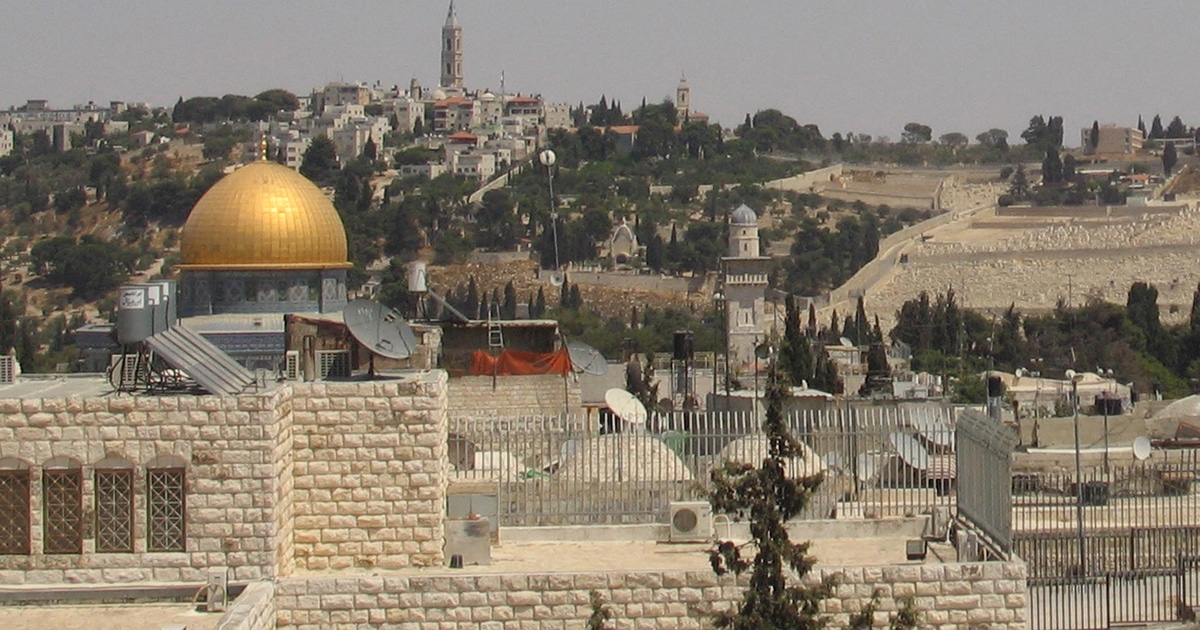While teaching at St. George’s College in Jerusalem during the 1990s, the Rev. Canon Dr. Richard LeSueur took up residence with his family on the top floor of a school run for Palestinian children. The school was run by the Episcopal Diocese of Jerusalem, overlooking the no-man’s land that separated East and West Jerusalem until 1967.
Currently an advisory board member of the Canadian Companions of the Episcopal Diocese of Jerusalem, LeSueur initially moved to Israel during the First Intifada. He was present in September 1993 when news broke of the Oslo Accords, a historic peace agreement between Israeli and Palestinian officials. LeSueur recalled the “staggering” experience of euphoria on the streets of Jerusalem, with Palestinian flags—until then illegal—flying everywhere.
“Young men were sitting on the hoods of cars,” he remembered. “They were shouting and waving. People were standing just in shock, frozen, holding their hands to their mouths. I saw an elderly man with tears running down his face.”
Thousands of Palestinians filled the soccer field next to St. George’s College to watch a live television broadcast the day the accords were signed at the White House. As a triumphant roar erupted from the crowd, LeSueur and his young son rang the bells of the cathedral tower in celebration.
The next day, he recalled, the Jerusalem Post ran a front-page story announcing an approved plan for vast new Israeli settlements for 150,000 people in the occupied territories in East Jerusalem. For those who placed hopes in the accords as a first step on the road to peace, the news, LeSueur indicated, “was like a huge slap in the face.”
The achievement of a just peace and reconciliation between Israelis and Palestinians is one of the 10 issues highlighted in the Anglican Church of Canada’s 2015 federal election resource. Reflecting the baptismal vows and prophetic witness of Christians to strive for peace in the world, the ongoing conflict in Israel and Palestine is particularly relevant in terms of its geographical location at the crucible of the Christian faith and as a microcosm for interfaith relations with Jews and Muslims.
“Jesus seemed in his ministry to consistently resist the distinctions between peoples that were customary to the religious and political perspectives of his time, and was constantly breaking down barriers to bring justice, love and fresh understanding to the common humanity of every human being,” LeSueur said.
“I think [as] Christians, our vocation compels us to give witness to the bold responsibilities of Christ’s love for all people, and therefore, to be a voice and an actor on the side of justice, equality, fairness and the dignity of every human being. And if that’s the case, then we are responsible to sound a voice about the conflict between Israelis and Palestinians in leading to peacemaking.”
The General Synod’s Global Relations Director, Dr. Andrea Mann, pointed to three key issues that continue to animate the Israel-Palestinian conflict.
The steady and increasing settlement of Palestinian territories by Israeli settlers with the support of the Israeli government is a major point of contention, Mann noted, pointing to ongoing claims on Palestinian villages as Israeli land through the continued bulldozing of Palestinian houses.
Counter-measures by Israel to Palestinian incursions such as rocket attacks, which Mann indicated are often disproportionate to the initial Palestinian actions, are another major issue.
“Where there is an initiative or a strike, say, from Gaza into Israeli territory, the response by Israel is in far greater measure, and has been shown to be without consideration for civilian life or hospitals or schools—the places where people gather for safety from those counter-strikes,” she said.
A third major issue is the Palestinians’ right of return, which relates to compensation to Palestinians for lands taken from them beginning in 1948 with the formation of the state of Israel, and the flight of hundreds of thousands of Palestinians who left homes behind and were never invited to return or compensated for the loss of their homes, livelihoods and communities.
Security, Mann added, is an important concern for both Israelis and Palestinians.
“We don’t want to be misunderstood by identifying these issues as only against Israel,” she said. “It is really clear that we are in support of the state of Israel existing in secure and sovereign borders, as we are for Palestine to exist for Palestinians within safe and secure borders.”
Each side in the conflict, LeSueur said, brings with it experiences of injustice and oppression that animate their attitude to the current tensions.
For Israelis, the memory of the Nazi Holocaust in which six million Jews were murdered continues to promote feelings of vulnerability, distrust of the wider world and the determination that such a tragedy must never happen again.
For Palestinians, the pressing need for statehood and adherence to internationally recognized borders under United Nations Security Council Resolution 242 stems from the ongoing oppression of life under Israeli military occupation, with access to trade and freedom of movement restricted through checkpoints and soldiers able to enter neighbourhoods and search homes at any time.
Any lasting solution to the conflict, Mann suggested, must be based on a common understanding and acceptance of the legitimacy of each other’s grievances.
“Always, I think, relationships between people can be strengthened to lead to friendship or at least mutual respect, mutual understanding, trust, dialogue, and a better understanding of one another’s perspectives, one another’s histories.”
View the 2015 federal election resource sheet on peace in the Middle East.
Interested in keeping up-to-date on news, opinion, events and resources from the Anglican Church of Canada? Sign up for our email alerts .

